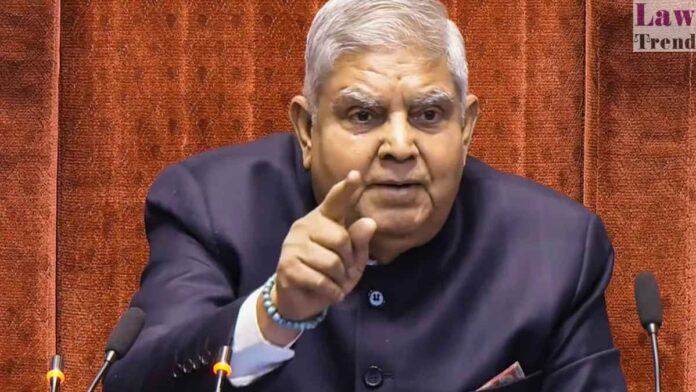Vice President of India Jagdeep Dhankhar on Friday strongly criticized the Supreme Court’s infamous verdict during the Emergency period, calling it “the darkest decision in the history of judicial institutions around the world.”
Speaking to a group of Rajya Sabha trainees, Dhankhar denounced the Supreme Court’s 1976 ruling in the ADM Jabalpur v. Shivkant Shukla case, which upheld the suspension of fundamental rights during the Emergency. “The verdict validated dictatorship and authoritarianism,” he remarked, referring to the apex court’s decision that overturned the judgments of nine High Courts across the country which had affirmed the right to judicial remedy even during the Emergency.
According to an official statement, Dhankhar said, “This was a time when the core of democracy collapsed during a crisis. People look to the judiciary during such times, but unfortunately, the Supreme Court failed them. The decision reversed nine well-reasoned High Court judgments and gave legitimacy to executive tyranny.”
Dhankhar also questioned the conduct of then President Fakhruddin Ali Ahmed, who signed the Emergency proclamation on June 25, 1975. “He acted on the advice of the then Prime Minister Indira Gandhi, not the full Council of Ministers,” Dhankhar asserted. “The Constitution is clear—no President can act solely on the advice of one individual. There must be a Council of Ministers led by the Prime Minister to aid and advise the President.”
He termed this deviation from constitutional procedure as a grave violation, highlighting that “as a result, over 100,000 citizens were imprisoned within hours.”
The ADM Jabalpur case was decided by a five-judge Constitution Bench during the 1975–77 Emergency. By a 4:1 majority, the Court upheld that during a national Emergency, citizens did not have the right to move courts for enforcement of fundamental rights under Article 21 (Right to Life and Personal Liberty).
Justices A.N. Ray, M.H. Beg, Y.V. Chandrachud, and P.N. Bhagwati formed the majority, while Justice H.R. Khanna dissented. Justice Khanna’s lone dissent emphasized that the right to life and liberty is inherent and not merely a constitutional gift.
Dhankhar said, “The Supreme Court’s judgment held that the will of the executive alone could determine the duration of the Emergency. Such a stance is unthinkable in any nation committed to the rule of law.”
Dhankhar welcomed the current government’s move to observe June 25—the day Emergency was proclaimed—as ‘Constitution Murder Day’ every year. The Emergency, which lasted from June 25, 1975, to March 21, 1977, was marked by large-scale arrests, press censorship, and curtailment of civil liberties.
Calling the court’s decision a “blot on India’s democratic values,” Dhankhar concluded by urging future generations to uphold the sanctity of constitutional governance and remain vigilant against any attempts to suppress fundamental rights.
The ADM Jabalpur case is widely regarded as a low point in the Indian judiciary’s history. In recent years, multiple judges, including sitting and retired justices of the Supreme Court, have expressed regret over the ruling. The decision has since been overruled in later constitutional jurisprudence, particularly in the landmark Puttaswamy (Right to Privacy) case of 2017.




